1. Palmolive Dish Soap – “You’re soaking in it.”
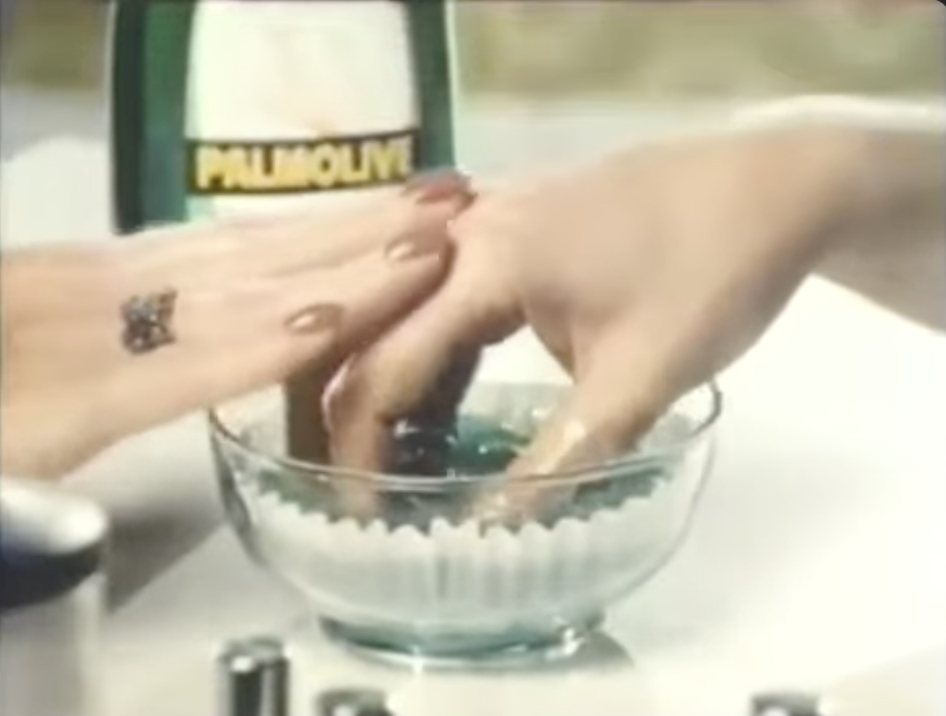
At first glance, it’s just a friendly salon scene. A woman dips her hand into a finger bowl while chatting with her manicurist, Madge. But then comes the twist: she’s not soaking in lotion. She’s soaking in Palmolive dish soap. Surprise! Your beauty treatment is actually your cleaning product. Madge smiles smugly as the woman recoils in shock, only to be reassured that, yes, even while getting your nails done, you could be softening your hands while doing the dishes. Domesticity, it seems, never takes a break.
This ad became a cultural catchphrase, and Madge turned into a pop culture icon. But behind the charm was a persistent message: your self-care better double as housework. Even at the salon, you’re not off duty. Palmolive ads told women they could multitask their way to beauty. Just keep your hands in dishwater, and everything will be fine. It was clever, memorable, and quietly exhausting. Because no matter where you were, the kitchen was always calling.
2. Geritol – “My wife was tired, listless…”
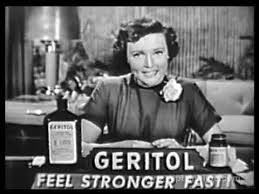
Oh no, not a cranky wife! In this gem of a spot, a concerned-looking husband faces the camera and explains, with all the bedside warmth of a refrigerator, that his wife used to be tired and moody. The horror. Thankfully, he discovered Geritol, a vitamin tonic that magically turned her into a smiling, obedient Stepford wife again. The message? Her personality flaws were clearly medical, and the cure was something he picked up at the drugstore. Take your vitamins, ladies, or risk losing your man’s approval. The absurdity of this ad is almost comical if not for the serious implications it carries.
This ad oozes with condescension, dressed up in a lab coat. It’s got all the charm of a sitcom dad diagnosing his wife’s mood as a problem to be fixed. Never mind that she might be exhausted from, say, raising kids, cooking meals, or not being allowed to have a real career. Nope, she just needed more iron. Geritol didn’t just sell supplements; it sold submission, shrink-wrapped in a bottle. And if you didn’t smile after taking it? You were probably doing it wrong. The dehumanizing aspect of this ad should evoke a sense of empathy in the audience, prompting us to question the societal norms it perpetuates. (Oh, and Yes, that’s Betty White)
3. Nair – “Who wears short shorts? We wear short shorts!”
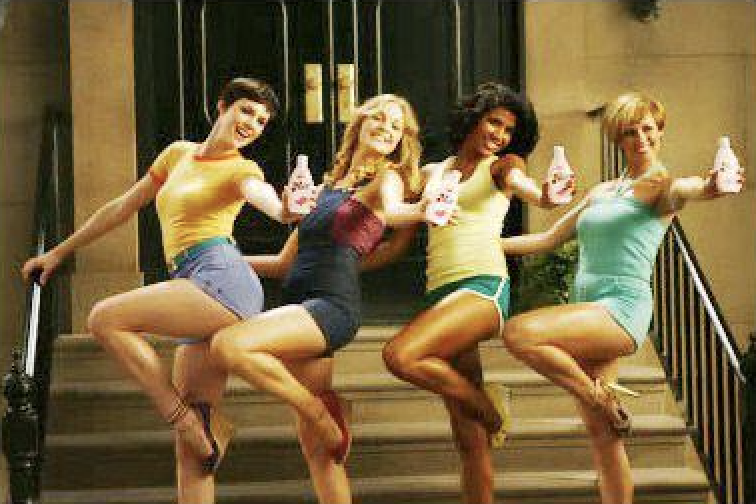
If you were a girl growing up in the ’70s, this jingle probably still lives rent-free in your brain. Bright, bouncy, and impossible to forget, Nair’s “short shorts” ad featured teenage girls strutting in cutoff denim and singing about their freshly shaved legs. It felt playful at the time, summery, fun, and full of youthful confidence. But peel back the catchy tune, and you’ve got a masterclass in preteen pressure, where smooth skin was suddenly a public performance. Even if you hadn’t hit puberty yet, the ad made sure you knew stubble was your enemy.
Looking back, the whole thing feels like a commercialized rite of passage. These girls weren’t just selling hair removal. They were selling the idea that being desirable started early and stayed skin-deep. The way the camera lingered on bare legs, the over-the-top giggles, the way it framed beauty as something you owed the world all of it hit differently when you were 12 and still figuring things out. It’s the kind of ad that shaped generations while pretending it was just good, clean fun. Want to feel old? That jingle first aired over 50 years ago.
4. Chase & Sanborn Coffee – “If your husband ever finds out…”
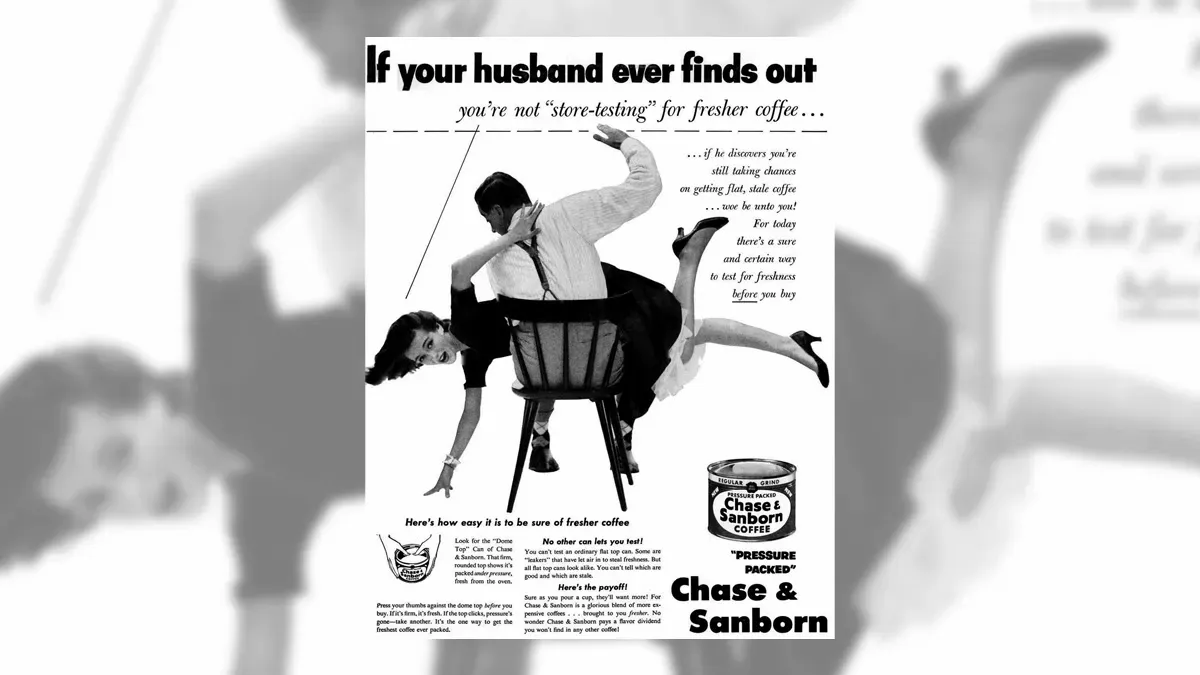
Imagine a print ad from a bygone era, where Chase & Sanborn Coffee depicted a husband spanking his wife for buying the wrong brand of coffee. The image shows her draped over his lap, mid-punishment, with a caption warning of what could happen if she ever made that mistake again. This ad, packaged with a wink, normalized domestic abuse as just part of marriage in postwar America. At the time, this was meant to be funny, even charming, like a sitcom gag pulled from I Love Lucy but without of any actual warmth or wit. The shock value of this ad in today’s context is undeniable.
Today, it’s hard to believe this ad ever ran in mainstream magazines. It reminds us that 1960s advertising didn’t just reflect cultural norms; it also helped shape them. It aggressively enforced them. Housewives weren’t seen as partners but as employees in the business of pleasing their husbands, right down to the coffee brand. The pastel dresses, the tidy living rooms, and the obedient smiles all mask a darker message: many women lived under this daily reality. The roast might’ve been medium, but the sexism was served piping hot.
5. Calgon – “Ancient Chinese Secret, huh?”
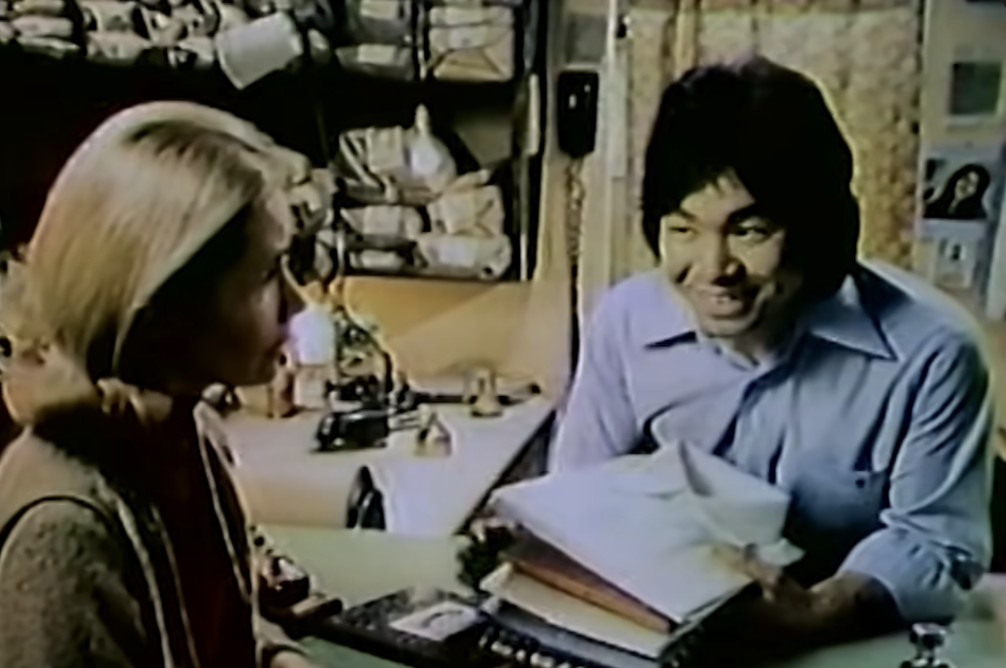
This one came wrapped in bubbles and casual racism. In the ad, a white woman drops off her laundry and marvels at how clean it comes back. When she presses the Chinese-American owner for his “secret,” his wife ruins the mystery: it’s just Calgon detergent. The punchline? The man sighs, “Ancient Chinese secret, huh?” with a defeated smile. It’s meant to be cute, but it’s laced with stereotypes. The fake accent, the exoticism, and the assumption that anything good must be mystical all play straight into the kind of casual bias that passed for humor in 1970s living rooms.
This wasn’t just a cringey one-liner. It reinforced the idea that Asian culture was strange and foreign, even when it was just soap. The laundry shop, the submissive wife, and the magical-sounding “secret” were tropes that TV had already taught Americans to expect. Calgon wrapped all of that into a 30-second ad and aired it during dinner hour. It’s one of those commercials that many people remember fondly, without realizing how deeply it played into the “othering” of an entire group of people. The Calgon ad, with its casual racism and reinforcement of stereotypes, is a stark reminder of the problematic nature of some historical advertising.
6. Noxzema Shave Cream – “Take it off. Take it all off.”

Cue the slow jazz and heavy eye contact. In this steamy slice of ’60s advertising, blonde bombshell Gunilla Knutson coos into the camera, urging men to “take it off… take it all off.” Sexy, but kinda racy for a TV ad. It was an ad for men’s shaving cream. But you’d never guess that from the breathy delivery, the silky lighting, or the way she practically undresses the viewer with her gaze. Never mind the actual product; it was just set dressing for another fantasy starring a silent woman and a well-shaved jawline.
The Noxzema ad blurred the line between hygiene and seduction, using innuendo like it was going out of style. (It wasn’t.) It wasn’t about a smoother shave. It was about selling men the illusion that their grooming routine could somehow attract a woman like Gunilla. And for the women watching at home? The takeaway was clear: even a man’s bathroom products weren’t safe from the constant drip of sexualization. The manipulative nature of this ad should make us all a bit more wary of the messages we’re being sold, even for a can of foam.
7. Toni Home Perm – “Which Twin Has the Toni?”
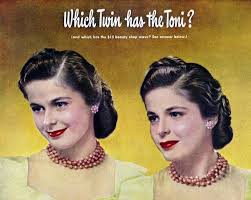
Ah, the eternal mystery: two identical women walk into a room, and the only thing that matters is which one used the right hair product. Toni’s famous “Which twin has the Toni?” campaign made hair conformity into a national guessing game. Personality? Irrelevant. Career ambitions? Who cares! If your curls weren’t bouncing just right, you were basically invisible. The ad featured men squinting and scrutinizing side-by-side women as if the fate of civilization depended on determining who had the perm.
Looking back, it’s incredible how much cultural weight was placed on a home perm kit. These ads were everywhere, in magazines, on TV, and even on posters at beauty salons, always with the same setup: twin girls, glossy smiles, and one defining difference. It was beauty as a competitive sport, where your goal was to be indistinguishable in the most desirable way. In Toni’s world, blending in was the ultimate win. Heaven forbid someone actually wants to look… different.
8. Playtex Girdles – “She was Fat Until She Wore This.”
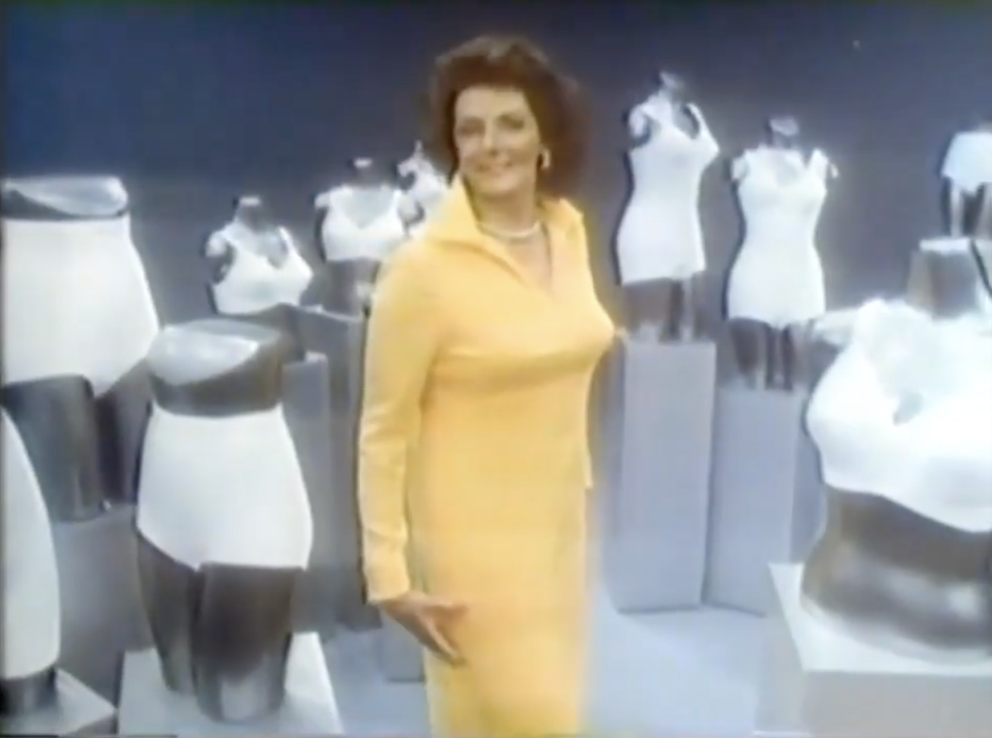
Well, thank goodness. According to Playtex, all it took to fix your entire life was one magical piece of elastic. These girdle ads weren’t subtle. “She was fat until she wore this,” they’d claim as if your body was a temporary problem to be corrected with industrial-strength undergarments. The before-and-after shots were dramatic: sad woman, bulging midsection, no man in sight. Then snap! She’s thin, perky, lovable, and apparently marriage material again. That’s some stretchy fabric.
What makes it worse is how cheerfully manipulative the whole thing was. The girdle wasn’t just shaping your waist. It was shaping your future. Playtex marketed these products as emotional armor, promising confidence, desirability, and perhaps even a husband who would stick around. And if it squeezed the life out of your internal organs? Well, beauty is pain. In the era of Jell-O salads and Tupperware parties, nothing said “you’re worthy” like suffocating in rubber for your man’s approval.
9. Winston Cigarettes – The Flintstones Smoke Break
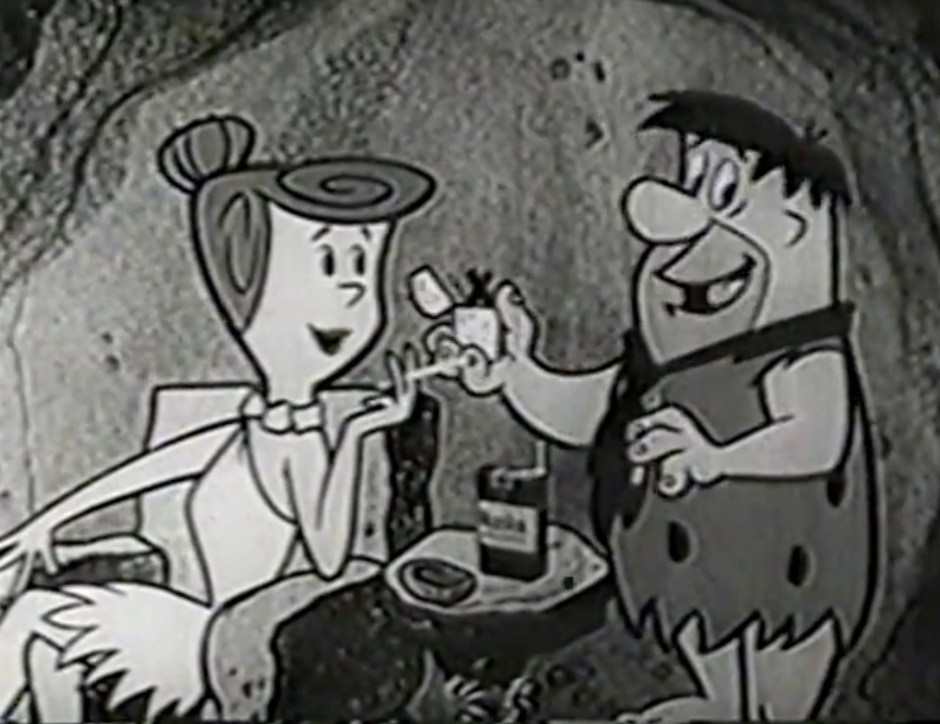
Picture this: It’s a sunny Bedrock afternoon, and Fred and Barney sneak away from their chores to light up some Winston cigarettes. Yep, your favorite Saturday morning cartoon stars were once the poster boys for filtered tobacco. They kick back, puff away, and complain that their wives are too busy cleaning to appreciate a good smoke. All of it delivered in that familiar Hanna-Barbera style, complete with chuckles and jazzy music. It was casual, catchy, and completely normal for 1961.
What’s wild is how unbothered it all was. This wasn’t a parody or an adult spin-off. It was a real ad targeting grown-ups during a family show. The idea that Fred Flintstone would pause from yabba-dabba-dooing to plug cigarettes now feels insane, but back then, it was just brilliant cross-promotion. Cigarettes were cool, housework was for women, and cartoons weren’t just for kids. Looking back, it’s a weird collision of nostalgia and cringe that reminds us just how much prime-time “fun” was really just smoke and mirrors.
10. Ajax – “White Knight” Cleans the Darkness
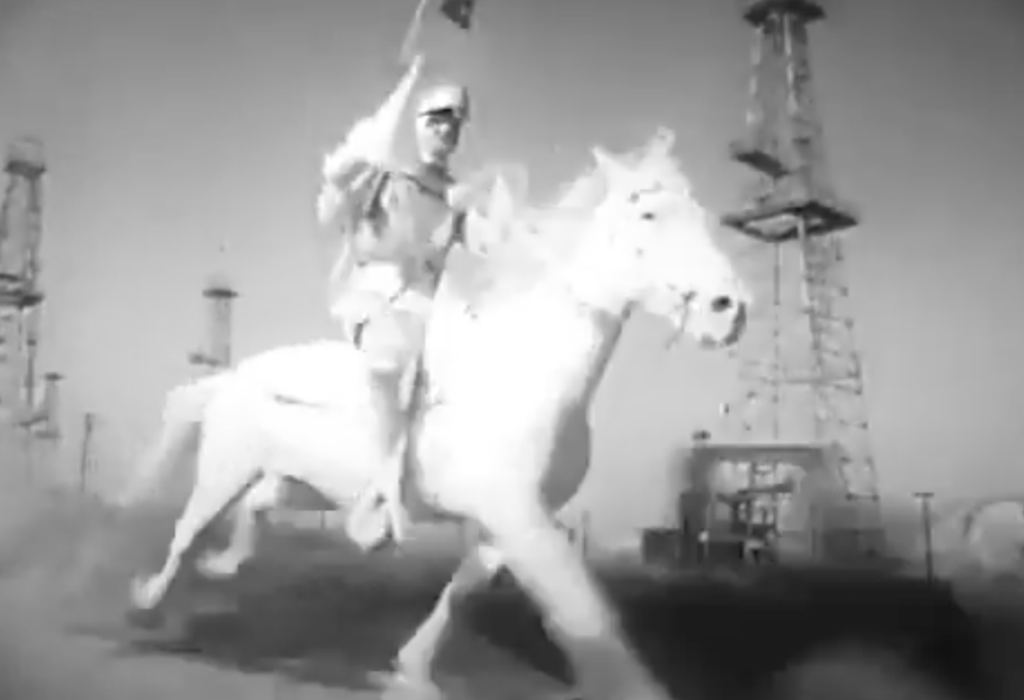
In this medieval-meets-mid-century commercial, a literal white knight gallops through suburban neighborhoods, brandishing a bottle of Ajax like a sword. His mission? To “cleanse” everything in sight. Floors, tubs, countertops —you name it —he scrubs them until they gleam a blinding white. The imagery was bold yet also subtly racialized. The implication was clear: whiteness equals purity, and anything darker must be scrubbed away. For a product meant to brighten tile grout, the symbolism hit a little too hard.
This wasn’t just over-the-top marketing. It was cultural messaging disguised as sparkle. The shining armor, the damsels in domestic distress, the magical power of whiteness… it was like watching a fairytale filtered through a 1950s ideology. And it worked. Ajax sales soared, and the ad stuck in the minds of homemakers for decades. But behind the foamy bubbles and clanging hooves was a narrative that reinforced some repulsive ideas. All that shone came at a cost.
11. Clairol – “Does She or Doesn’t She?”
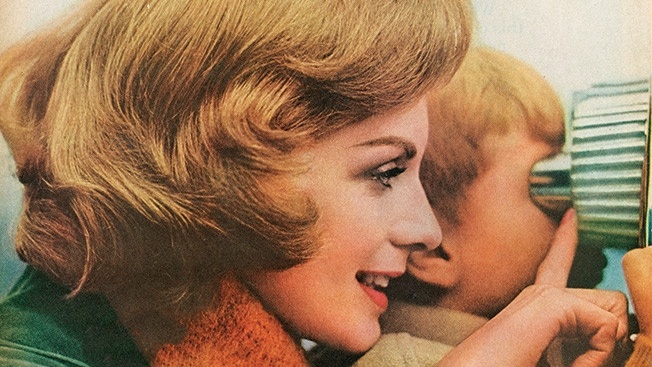
It was the whisper heard around the country: “Does she… or doesn’t she?” Clairol’s iconic hair dye campaign leaned into secrecy, suggesting that a woman could color her hair, especially blonde, without anyone ever knowing. The goal wasn’t transformation. It was an illusion. With soft-focus photography and smiling, modest housewives, the ads promised that you could enhance your beauty without giving away the game. In other words, femininity was a performance, and your job was to make it look effortless and natural, even if it was anything but.
This wasn’t just about hair. It was about control. The pressure to look young, desirable, and polished was slipped into every box of dye. The slogan didn’t encourage bold choices. It encouraged quiet conformity. You weren’t supposed to tell anyone you dyed it, just like you weren’t supposed to talk about wrinkles or age or ambition. In the Clairol universe, the best women were the ones who fooled you pleasant, pretty, and preferably silent about the whole thing.
12. Chef Boy-Ar-Dee – Cartoon Italians Say “Mamma Mia!”
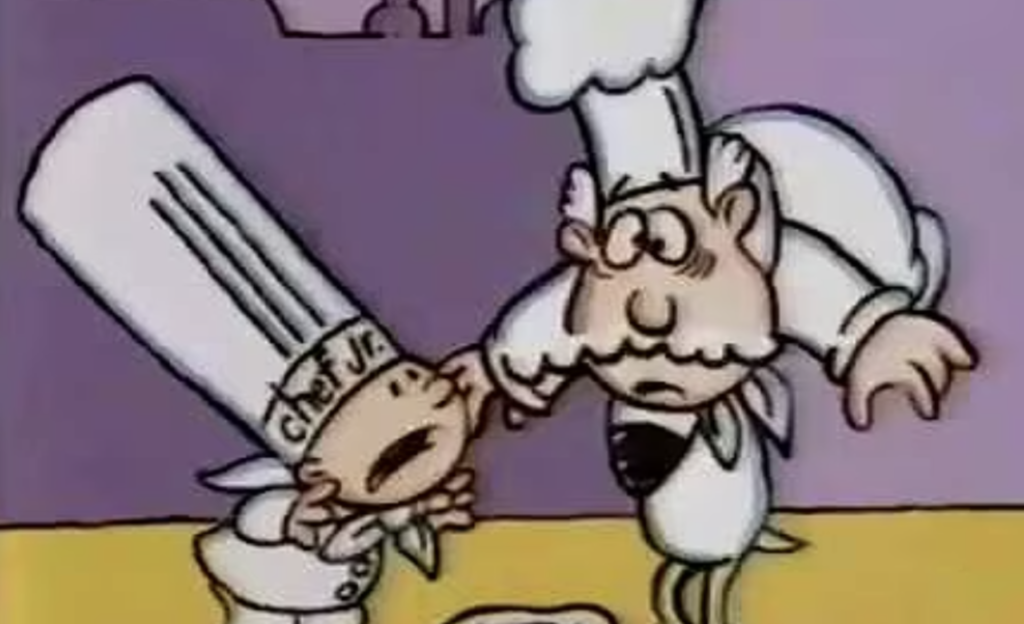
Before Mario was stomping on Goombas, there were the mustachioed cartoon chefs of Chef Boy-Ar-Dee, flailing their arms and shouting “Mamma Mia!” in spaghetti-thick accents. These ads leaned hard into the stereotypes: exaggerated gestures, big noses, and over-the-top exclamations that made Italian-Americans look more like caricatures than people. The message was simple: authentic Italian cooking in a can! Just add boiling water and a cartoon mustache. If you didn’t know better, you’d think all Italian cuisine came straight from a red-and-white checkered tablecloth and a comedy sketch.
The strange part? For a lot of American households, this was their introduction to Italian food. The commercials made it seem like canned ravioli was passed down from nonnas in Brooklyn walk-ups when, in reality, it was a mass-market shortcut wrapped in a stereotype. It wasn’t malicious so much as mindless, lazy shorthand for “ethnic flavor” served up with a wink. But looking back, it’s clear these ads didn’t just sell sauce. They sold a watered-down version of culture, one cartoon chef at a time.
13. Goodyear Tires – “When There’s No Man Around…”
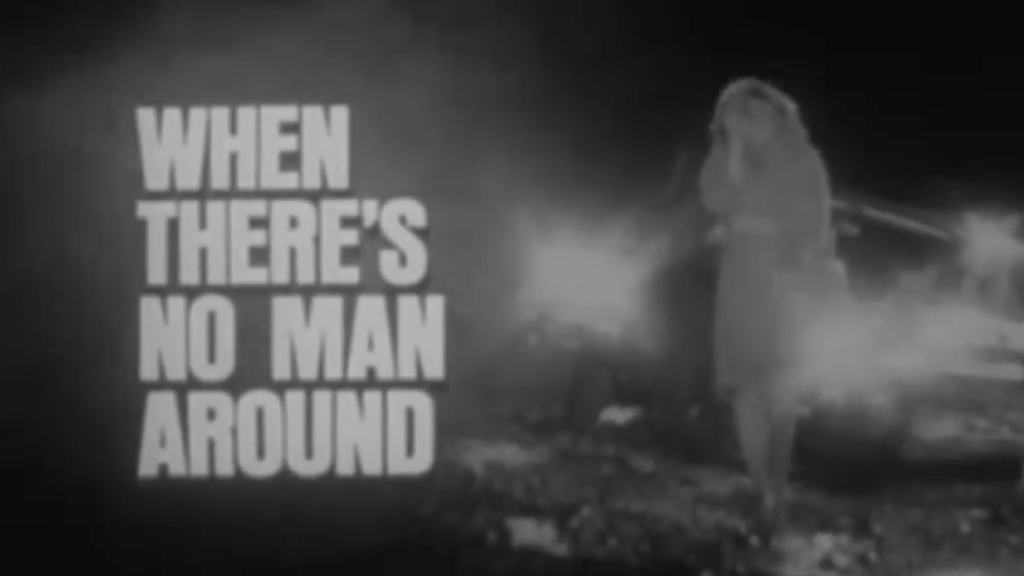
Cue the dramatic music and zoom in on a stranded woman in heels, staring helplessly at a flat tire on the side of the road. “When there’s no man around…” the narrator warns as if she’s moments away from a full collapse. But wait, hope arrives, not in the form of roadside assistance, but in the holy grail of tire technology: Goodyear Double Eagles. With these miraculous tires, she won’t have to lift a finger or call a man. Because according to the ad, a flat tire is basically a personal crisis… unless your husband planned ahead.
This wasn’t just a tire commercial. It was a trust fall into gender roles. The woman didn’t fix anything; the man did, in advance, by buying the “right” tires to protect his delicate wife from the scary world of auto maintenance. No tools, no independence, just reinforced helplessness dressed up as safety. The irony? Women were already learning to change their own tires and run their own errands, but advertisers were still stuck in neutral. At least the jingle was catchy.
14. Mr. Coffee – “This Coffee is Undrinkable!”
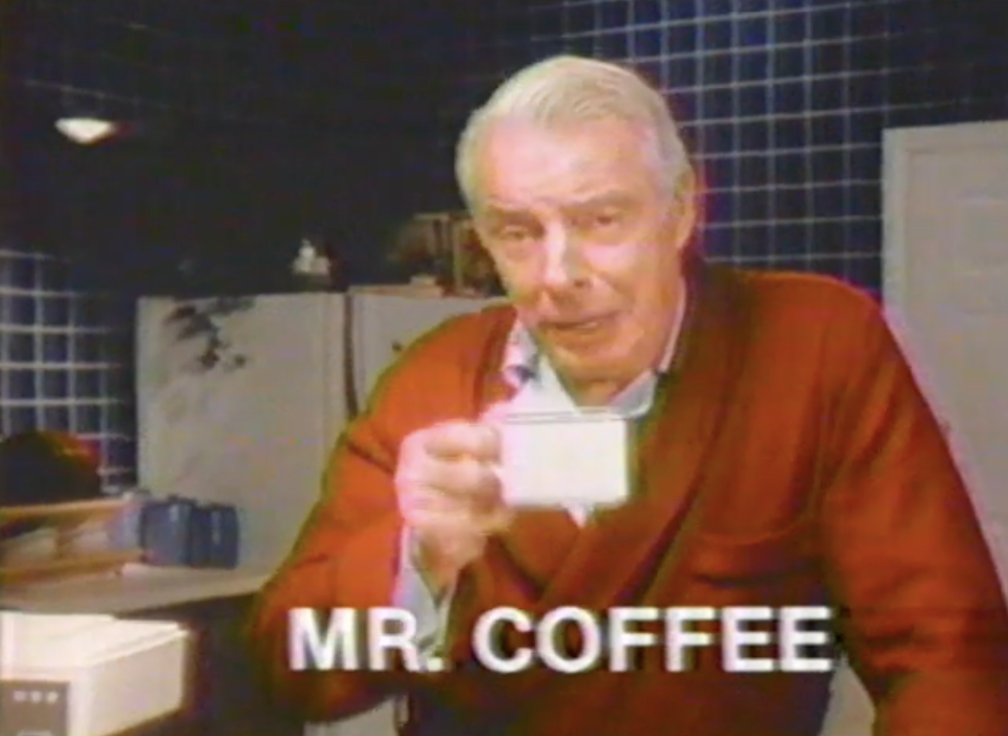
Dinner’s on the table, the roast is dry, and here comes the kicker: her husband takes one sip of coffee and recoils in theatrical disgust. “This coffee is undrinkable!” he snaps, as though she’s just ruined Thanksgiving. That was the premise of this infamous Mr. Coffee ad: a husband so incensed by mediocre brew that he practically questions the foundation of the marriage. Luckily, salvation comes in the form of a new coffee maker. Once she upgrades to Mr. Coffee, he softens. She’s redeemed. Disaster averted.
It wasn’t just about caffeine. It was a test of loyalty, devotion, and whether or not she could keep him from walking out the door. The subtext was loud and clear: her job was to please, and a bad cup meant she’d failed. Never mind his tone, his manners, or the fact that she was doing all the work in the first place. In this house, the coffee maker had more emotional power than the wedding vows. Joe DiMaggio pitched the product, but the real pitch was perfection or else.
15. Mr. Clean – “He’ll Do the Work for Her.”
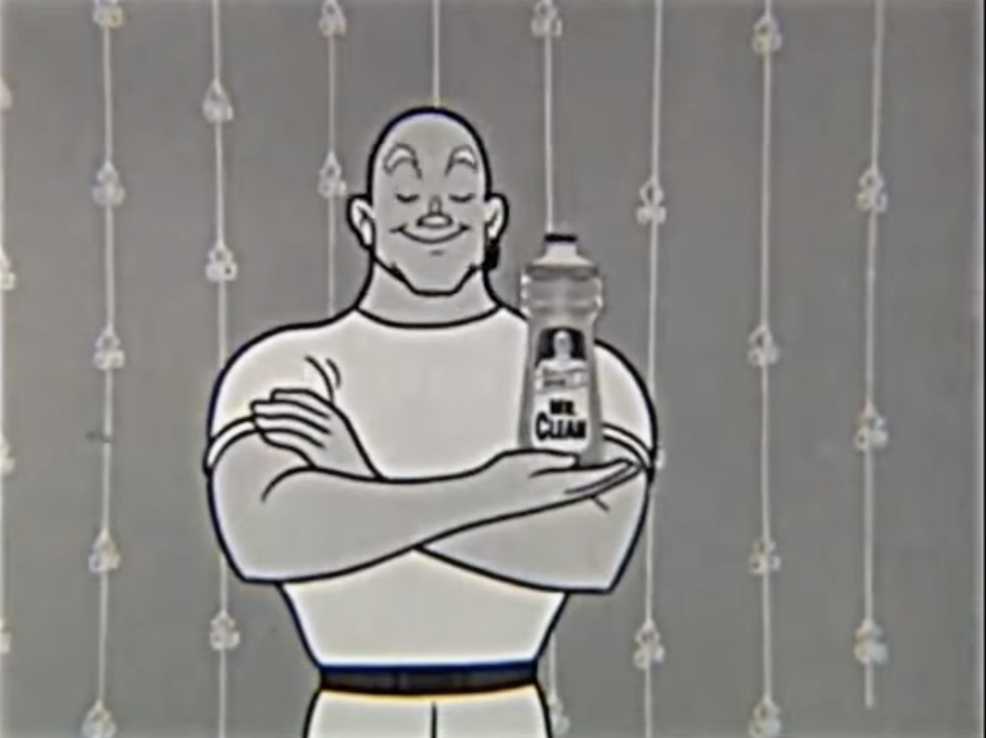
Ah, yes, the original bald fantasy, Mr. Clean. With his tight white shirt, gleaming earring, and biceps that could scrub a sink into submission, this ad icon promised he’d help “her” get the job done faster. Not do the cleaning; mind you, just help her do it better. The commercials always showed exhausted women magically rejuvenated when Mr. Clean showed up to lend a hand, like a domestic genie summoned by elbow grease and despair. He wasn’t a partner. He was reinforcement.
It was wish fulfillment with a mop. Mr. Clean wasn’t there to challenge the idea that cleaning was a woman’s job. He was there to make sure she kept doing it, only more efficiently. The sparkle, the speed, the satisfied husband at the end it was all part of the performance. And Mr. Clean? He wasn’t really for her. He was a marketing mirage, built to keep her smiling while she scrubbed. All shine, no shift.
16. Schlitz Beer – “She Lost Him Over a Beer?”
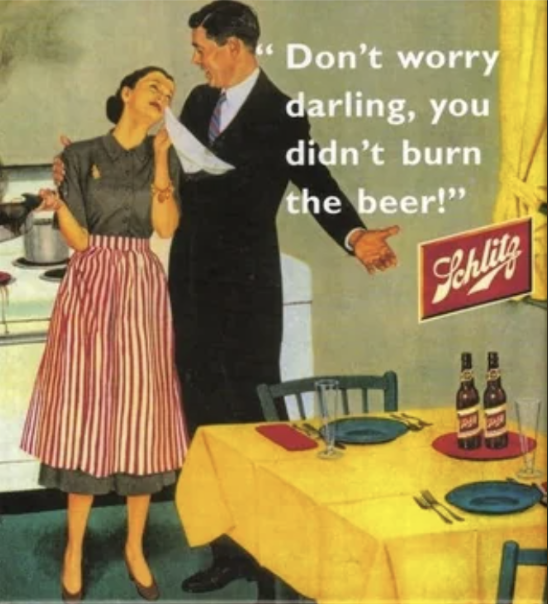
It starts with a scene straight out of a domestic disaster film: a woman in pearls burns dinner, her husband rises from the table in a silent rage, and she stands there, trembling, about to lose it all. The narrator drops the line like a gavel: “She lost him… over a beer?” The solution? Not an apology or a second chance, but handing him a cold Schlitz. Suddenly, he turns back, smiles, and all is forgiven. Because one wrong casserole can end a relationship, but the right beer saves the day.
There’s so much to unpack in thirty seconds. The woman’s tears, the husband’s icy exit, the product-as-marriage-counselor it all plays like a parody, except it wasn’t. Schlitz wasn’t just selling beer; it was selling control. She was portrayed as foolish, maybe even a little pathetic, until she redeemed herself with the “correct” brand. Forget communication or mutual respect. In this house, salvation came in a brown bottle, and a woman’s worth was measured by what was in the fridge.
17. Hoover Vacuums – “Christmas Morning, She’ll be Happier with a Hoover.”
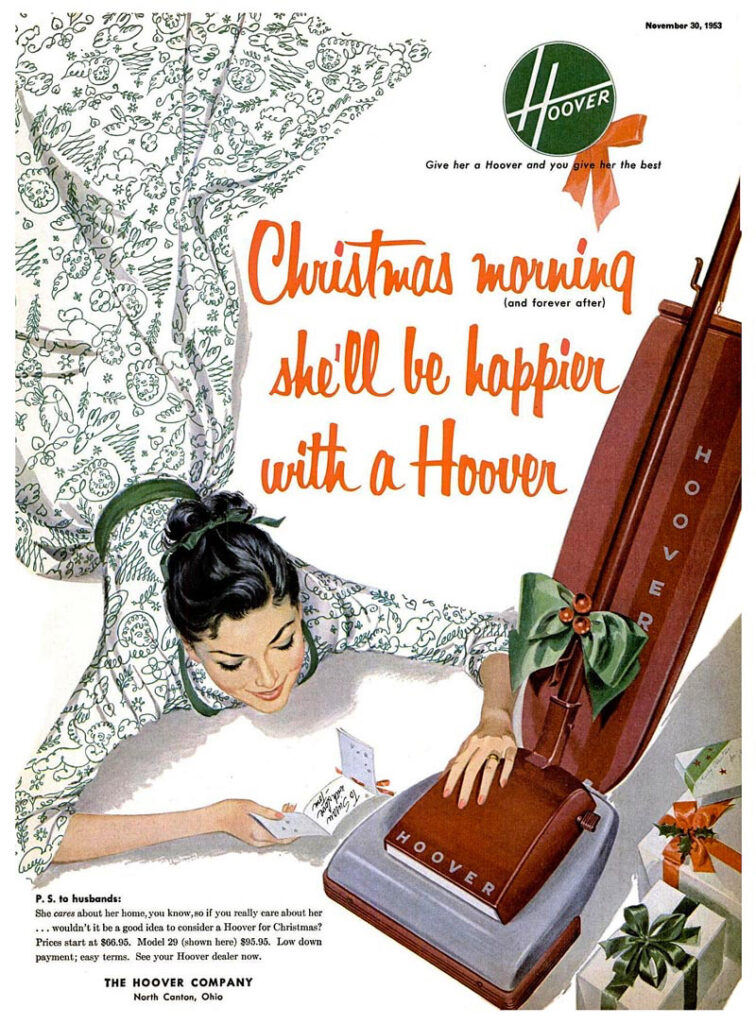
Cue the sleigh bells and perfectly wrapped boxes under the tree. A man stands proudly beside a Hoover vacuum, beaming as his wife opens her Christmas gift. Her face lights up not with confusion or horror but with delight. Because nothing says “I love you” like giving your wife a machine to clean the house more efficiently. The ad plays it sweet and wholesome, framed in a warm holiday glow. But at the heart of it is one big, shiny message: her happiness is directly tied to her ability to keep a tidy home.
This wasn’t just a gift suggestion. It was a cultural script. While men got watches or golf clubs, women got irons, vacuums, and permission to feel grateful for them. These ads didn’t challenge gender roles. They wrapped them in ribbon and called it joy. And for millions of women flipping through catalogs or watching TV in December, it quietly reinforced the idea that their value was measured in spotless floors and silent appreciation. Merry Christmas, now get to work.
18. Kent Cigarettes – “What a Woman!”
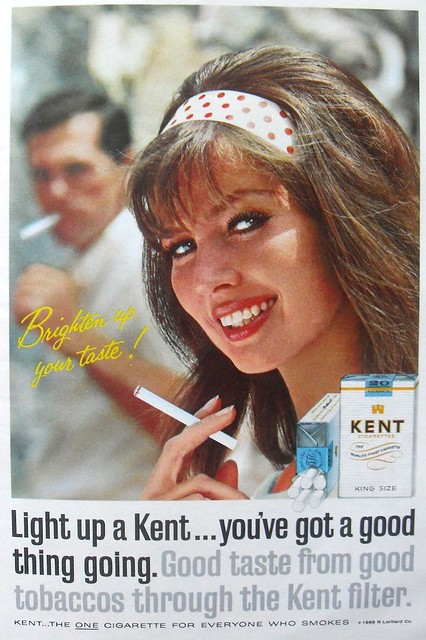
In this slice of smooth-filtered judgment, a man lights a Kent cigarette and turns to evaluate the woman beside him based entirely on whether or not she accepts one. “What a woman!” he declares as if her entire worth hinges on her brand preference. If she smokes Kent, she’s classy. Sophisticated. Deserving of his attention. If she declines? The ad doesn’t say, but the implication hangs in the smoke. These kinds of cigarette ads didn’t just sell tobacco; they sold a fantasy of approval where women passed or failed a man’s test in a single puff.
There’s something almost cartoonish about the confidence these ads had in their own logic. A cigarette didn’t just taste better. It revealed character, loyalty, sex appeal, and even status. Women weren’t the target audience; they were props in the male consumer’s theater of cool. It’s Mad Men-level absurdity, down to the crisp suits and smirking glances. Looking back, it’s less seductive than sad because, beneath the filter, it’s just another version of, “She’s only worthy if she buys the right brand.”
19. Van Heusen – “Show Her It’s a Man’s World”
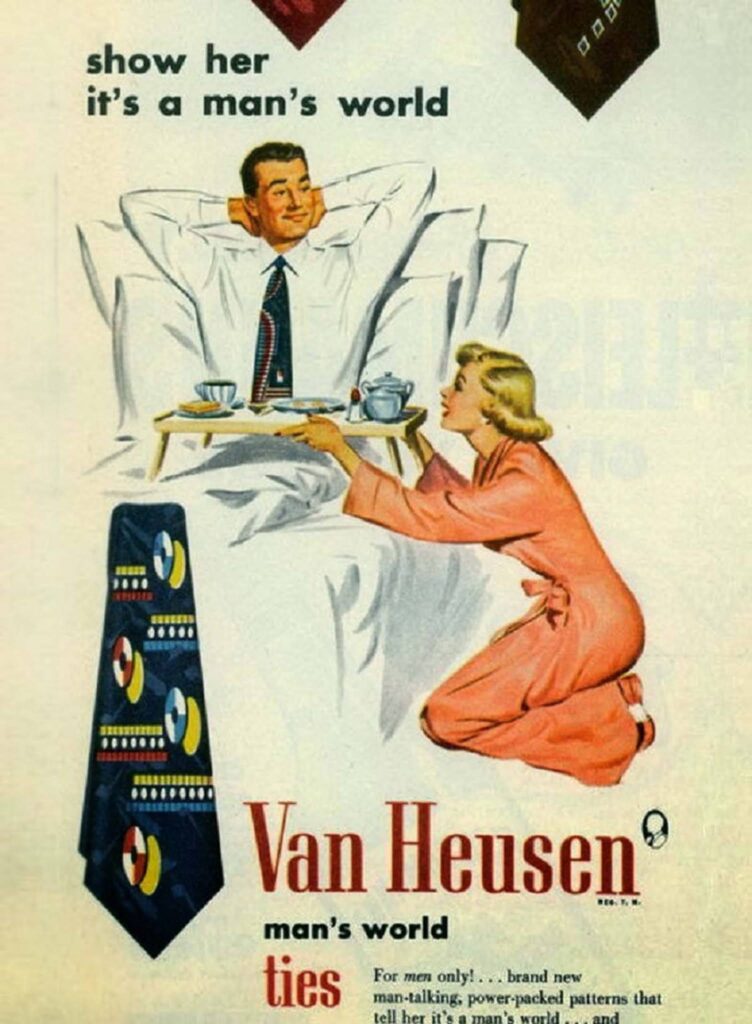
If there were a Mount Rushmore of jaw-dropping misogyny in advertising, Van Heusen’s necktie campaign would be carved in stone. One infamous print ad shows a woman kneeling in bed, serving her husband breakfast on a tray while he lounges in smug satisfaction, ties perfectly knotted, of course. The tagline? “Show her it’s a man’s world.” It wasn’t just selling menswear. It was pushing dominance as an aesthetic. A tie wasn’t just part of the outfit. It was the scepter of power in your suburban castle.
These ads ran throughout the 1960s and ’70s, cloaked in masculine glamor and patriarchal pride. They offered no pretense of equality, just a fantasy where women smiled their way through servitude while men were rewarded with eggs, coffee, and the quiet adoration of a well-trained wife. Today, the campaign reads like a visual instruction manual for fragile masculinity. Van Heusen may have sold ties, but the real product was entitlement.
20. Budweiser – “Keep her in her place”
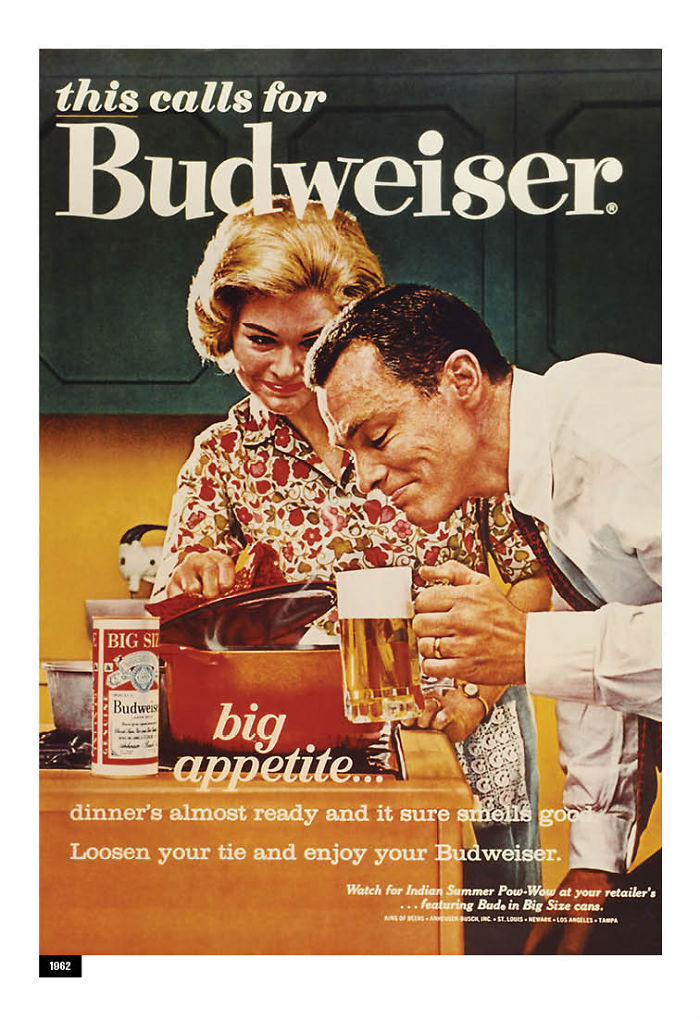
In one of the most stomach-turning entries in beer ad history, Budweiser ran a print campaign in the 1970s encouraging men to “keep her in her place.” The image? A smiling woman offering her husband a cold Bud, usually while crouching or serving. The implication was loud and clear: a happy wife is a submissive one, and the key to domestic bliss was making sure she had a six-pack chilling and her mouth shut. No eye-rolls allowed, just deference, decolletage, and a perfectly timed delivery.
It was the kind of ad that didn’t wink. It stared you straight in the face and dared you to disagree. While some brands at least wrapped their sexism in euphemism or innuendo, Budweiser was refreshingly blunt about it. These weren’t just commercials. They were domestic commandments printed in bold type. And for the women flipping through magazines, the message was as frosty as the beer: your place is wherever he tells you it is, preferably with a cold one in hand.
21. Alcoa Aluminum – “Even a woman can open it”
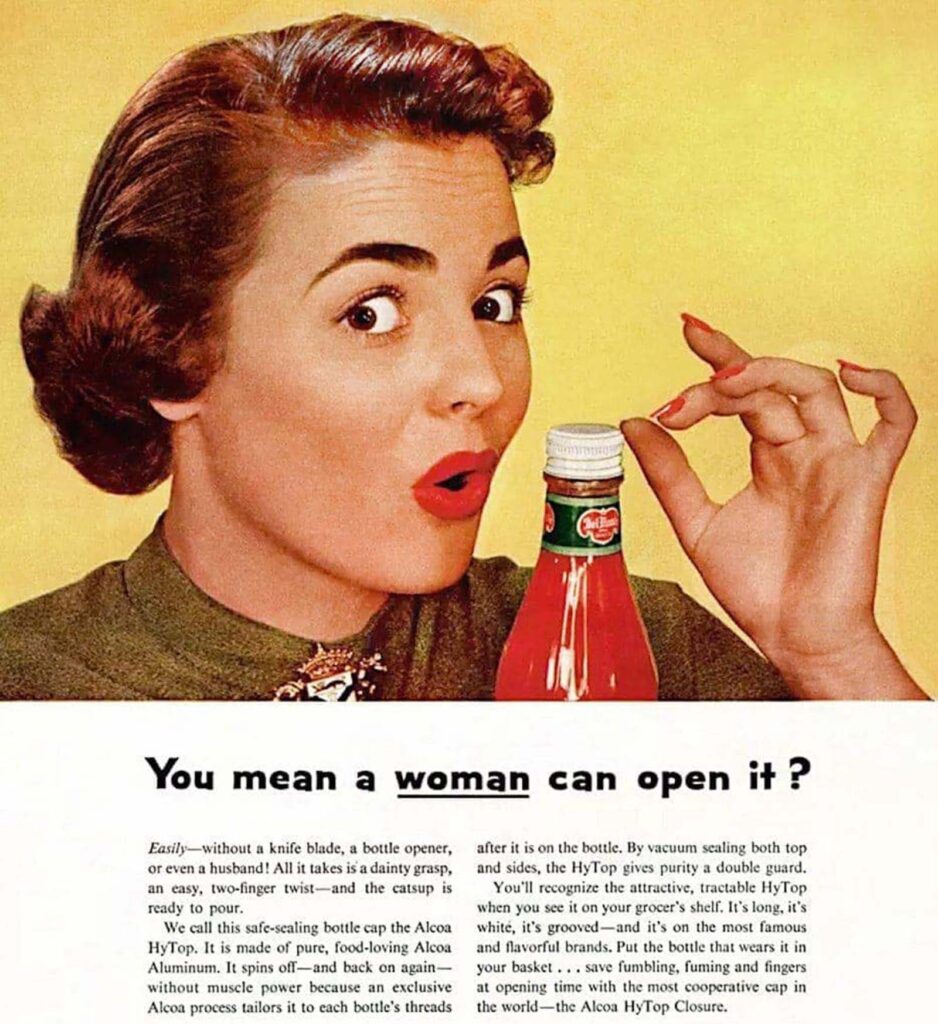
This real-life ad for Alcoa aluminum twist-off bottle caps managed to insult half the population in just seven words: “Even a woman can open it.” That was the entire pitch. A bottle cap so simple, even she could manage it. The print version featured a woman with perfectly manicured hands delicately twisting open a soda bottle, her expression somewhere between amazed and relieved as though unscrewing a cap had previously required a blacksmith and divine intervention.
It’s the kind of ad that makes you laugh out loud and then shake your head in disbelief. There was no subtlety, no spin. It just doubled down on the idea that women were too weak, too dainty, or too simple to function in the world of packaging innovation. And yet, this ad ran in actual magazines, approved by actual people who thought it was clever. The real twist? Women had already been opening bottles, running companies, and managing households just fine. But sure, thanks, Alcoa, for the validation.
This story, 21 Vintage TV Ads from the ’60s and ’70s That Are Shockingly Offensive, Creepy, or Just Plain Wrong was first published on dailyfetch.net.


